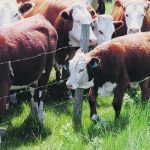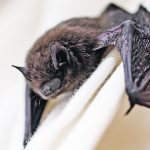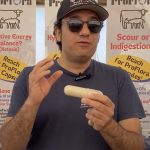BioFerScience has encapsulated propylene glycol into a bolus to make it easier to administer the product to cows
Glacier FarmMedia – Giving cows a propylene drench to treat ketosis can be challenging and physically demanding for humans and risky for the animals. BioFerScience, a London, Ont., company, has created an alternative that is easier and safer to apply. Ketosis occurs when a cow is in a negative energy balance and uses up body […] Read more Livestock Management
Livestock Management

Products to relieve stress in cattle continue to evolve

Predation program accepts any scanning system
A 10-year-old Saskatchewan initiative to reduce sheep losses to predators has expanded its RFID technology acceptance
A change to the Saskatchewan Crop Insurance Corp.’s RFID Sheep Policy is making participation easier for sheep producers. The pilot began in 2014 with a goal to provide producers with a goal to compensate producers for predation and to prove without physical evidence that an animal was missing. To do so, it used data from […] Read more
Cow herd recovery remains elusive
Despite high cattle prices, there are few signs that producers are preparing to increase the size of their herds
Glacier FarmMedia – High calf prices have been a good news story for cow-calf producers, but they’ve done little to help Canada recover its diminished beef herd. “According to Statistics Canada, we’ve seen a decrease in total cattle inventories in Alberta from 5.225 million on July 1, 2023 to 5.145 million on the same date […] Read more
Study finds bat population crash increases insecticide use

Breeding dairy cows to beef seen as beneficial
Beef on dairy can improve meat’s marbling, yield, quality and carcass cutability without affecting milk production
Breeding beef animals to dairy cows is becoming more common, says Kee Jim, senior lead of animal agriculture at Telus and managing director for G.K. Farms. He shared more information about beef on dairy with attendees at last month’s Canadian Beef Industry conference. “In my 41 years of doing feedlot work and being involved with […] Read more
Scientists begin research on gene-edited pigs
Biotech experts say the public is likely willing to eat meat from gene-edited livestock if provided with the proper context
Glacier FarmMedia – Pigs with genes manipulated for disease resistance are in the works. Gene-edited pigs resistant to porcine reproductive and respiratory syndrome (PRRS) could be a commercial reality as soon as 2026 in the United States, but one expert says it’s unclear how Canada’s regulatory system will respond. “Based on the science that they’ve […] Read more
New survey drills into cow-calf sector
The Beef Cattle Research Council says the national survey is intended to replace previous regional surveys
Glacier FarmMedia – Results from the first Canadian Cow-Calf Survey, which gathered insights from 600 producers across Canada, have been published by the Beef Cattle Research Council. The project is meant to provide a comprehensive assessment of cow-calf production practices and herd performance throughout the country and was spearheaded by the council and Canfax, as […] Read more
Missouri health worker who had contact with bird flu patient develops symptoms, US officials report

Microbes matter during pasture restoration
Research finds that the relationship between alfalfa genetics and microbes in the soil can alter growth of the plants
WINNIPEG — Choosing the right alfalfa variety can make a difference, possibly a huge difference, when producers are rejuvenating a pasture. After several years, the productivity of a pasture will decline and many ranchers choose to over-seed or sod-seed alfalfa to revive the pastureland. Farmers will likely select a high-yielding alfalfa variety that is adapted […] Read more


 Livestock Management
Livestock Management


